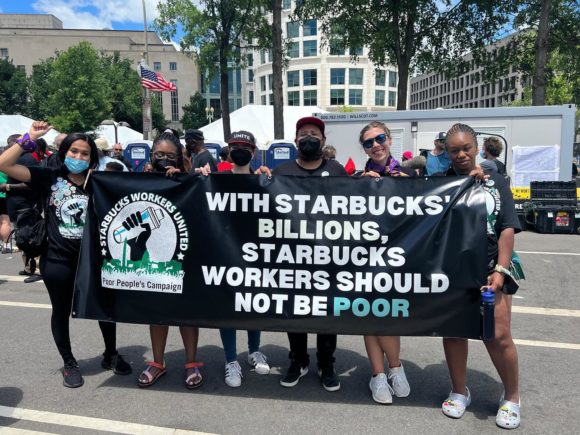The New Union Movement is sweeping the country.
At least you would think so reading or listening to the popular media.
But it isn’t.
Some Starbucks stores have voted to unionize, and an Amazon fulfillment center on Long Island has voted to organize too, but to me the shocking fact is how few of America’s massive corporations, which have grown hugely over the last 30 years, have seen unions take root.
I have been trying to figure out why the union movement has been so unsuccessful in recent years except in organizing school districts and government workers. Perhaps one of the main reasons for their failure is the visibility of the results produced by unionized schools and municipal governments. Public schools are generally in disrepute in this country, and enrollments are dropping in many locations. Governments are viewed as bloated and ineffective, at least in the larger more visible units.
Meanwhile, Amazon, Starbucks, and most of Silicon Valley has grown and grown without unions gaining a foothold. Industrial companies have fled to Asia or Mexico, where there are no unions, and to the American South, where the union movement is viewed suspiciously. Even the auto industry, which is a long time bastion of unionization, has grown in this country almost completely free of unions for the last 25 years.
One could argue that the laws make it hard to organize or that the massive power of big firms have held their collective thumb over fledgling union efforts, but unions in the United States have generally had governments which have been sympathetic and have big potential financial support if they can get a footing.
Why can’t the new union movement take hold, particularly in a period of labor shortages and companies frantically attempting to hire even people with poor work records or former prisoners? This should be a fertile time for organizing. Handling packages at Amazon is demanding and leads to many hand injuries, yet Amazon has used high hourly wages, health insurance plans, and education incentives to enable it to keep hiring without unionization.
America’s expensive colleges have also made Amazon and Starbucks viable part-time alternatives for many young people. Firms like Amazon, Starbucks, and Walmart navigate their hiring needs by limiting the number of full-time employees. Workers who are busy with school, childcare, and second jobs, do not view these temporary jobs as careers, and union dues for short-term employment makes unionizing much less attractive. Part time work with higher hourly wages is viewed as a better alternative to a pension and 30 years at the same job.
Companies have also been shrewd in showing a much less adversarial stance than in the past, when the boss was usually seen as a hated tyrant.
But have we reached a new tipping point where homegrown unions with financial backing finally begin to gain ground? It is certainly possible with jobs available all over. China is less appealing for big firms today. Mexico has personal safety and language barriers.
Will we see a unionized Amazon or Google or Starbucks in a few years? What do you think? Do you find union jobs appealing? Will small businesses be forced to unionize in order to hire? Or, will the percentage of union workers, even with laws slanted in their favor, strengthen over time?
Question: What would entice you to join a union?


1 Comment
If I were a lazy slug, a union would be great!
Or better yet, if I could get Randi Weingarten’s job!!!
Unions in years past would advocate for safety, fairness and proper working conditions.
We now have OSHA, minimum wage, and other labor laws to address serious matters
AFT head Randi Weingarten makes over $560,000 per year, 9 times average teacher salary, records show
In 2019, Weingarten received a salary of $489,844 along with $74,392 in other compensation, bringing her total haul for the year to $564,236, according to the AFT’s Internal Revenue Service Form 990 for that year, the most recent year available.
How did she do that?
A corrupt system.
The government employed teachers negotiating with politicians that got elected with the donations from their union dues…
Sounds fugazy to me, but what do I know?
Unions work to the lowest common denominator.
What benefits does it bring for the employer?
Just today in the HuffPo:
Workers at the Trader Joe’s Wine Shop in Manhattan spent the last four months laying the groundwork to unionize their store. A small organizing committee met regularly to discuss strategy around building support to join the United Food and Commercial Workers union, and they planned to go public with their effort the week of Aug. 15.
But in the early morning hours of Aug. 11, Trader Joe’s abruptly informed them it was closing the popular wine shop, its only one in New York City.
If you are intelligent, industrious, and ambitious you can negotiate for a better deal, or go elsewhere.
in a union you just have to accomplish the bare minimum and muddle along.
I have seen too many shops where the hardcore union members force the ambitious employees to:
“s l o w d o w n” (or else…) you are making the rest of us look bad.”
Just as minimum wage increases, hurts the most vulnerable.
I could go on, but need to get back to paying taxes…